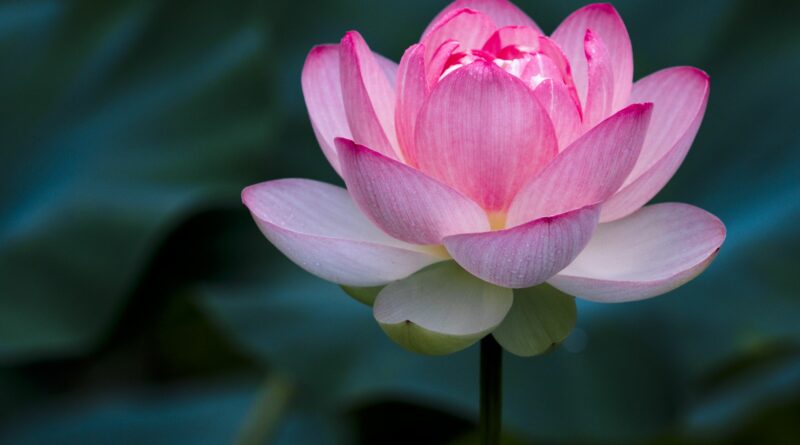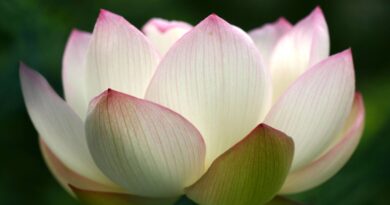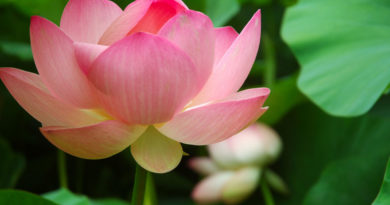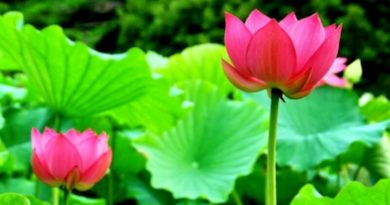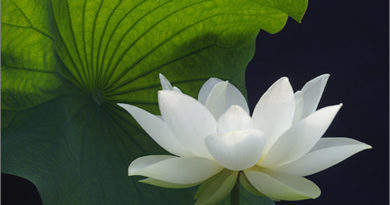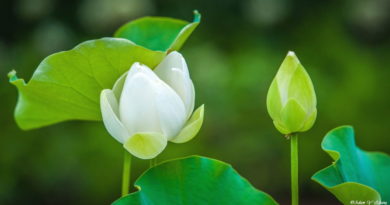DHAMMA RATANA – CHAPTER 8: THE FIVE CONDUCIVE CONDITIONS
DHAMMA RATANA – CHAPTER 8: THE FIVE CONDUCIVE CONDITIONS
The Atthakatha teachers have explained fully that practising yogi will attain dhamma provided that they have conditions which are conducive for meditation practice. Buddha has pointed out the five conducive conditions. (Sappaya dhamma). They are:
(1) Accommodation
(2) Climate
(3) Food
(4) Company
(5) Audition of dhamma
These five conducive conditions are the forceful supporting factors for the practising yogi to attain dhamma They will gain dhamma according to their perfections. Therefore yogi should endeavour to practise dhamma when they have a chance to enjoy these conducive conditions.
(1) Accommodation
Accommodation is a powerful supporting factor for a practising yogi. When yogi has to practise in an unsuitable accommodation such as a place with a leaking roof and unsafe, he would be unhappy, anxious and disheartened. Therefore concentration cannot be well developed and it is difficult to attain magga and phala nana. If you are fortunate enough to meditate in a conducive condition, ponder upon it thus, “must practise diligently, must practise diligently.” Merit is gained by reflecting thus, in turn these merits can also be supporting factors for meditations.
(2) Climate
Buddha has remarked, “Climate also is another powerful supporting factor for the attainment of dhanima.” When you enjoy an equable climate remind yourself not to forget and reflect thus, “must try to practise to my utmost.” On the other-hand when the climate is not equable it becomes a disturbing factor for the practising yogi. In the extreme weather yogi is uneasy and miserable and gain no dhamma. Hence, there is no concentration and no insight wisdom. It is important to choose a place with suitable climate or practising dhamma.
Suppose you have good friends and meditation instructors in Kalaw and Taunggyi, nevertheless to practise meditation in those places in winter is unthinkable. As it is too cold there, some of the meditation centers have to be closed in winter time. So also to meditate in places like Mandalay and Pakhokku, with high temperature during Summer, is not conducive for the attainment of dhamma. So, you see, an equable climate is a forceful supporting factor for meditation practise. So with delight reflect upon the equable climate in which you are meditating, “must practise earnestly, must practise earnestly”.
(3) Food
Buddha said that food is also an important supporting factor in meditation practice. When you are provided with agreeable food, be thankful and reflect, “practise diligently; practise diligently’. On the other hand when food is not agreeable yogi is dissatisfied, thence he could not concentrate well enough to develop wisdom. Therefore he is far from magga and phala. There are many instances of even would be-arahants who could not cultivate dhamma because of disagreeable food.
Once, (60) monks, after receiving The Buddha’s instruction on meditation, at Zetavan Monastery, Savatthi, went to a village called Matika, at the foot of a hill, in search of a place for meditation. The mother of headman of that village was also known as Matikamata. She saw the (60) monks entered the village stepping mindfully one by one in a line. She was so pleased and became pious that she sent a man to fetch the monks to her house. On their arrival she offered alms and enquired respectfully about their purpose. Upon hearing that they were going to a place suitable for meditation practice, she at once knew that the monks had no particular place in mind.
She at once requested the monks, “Please, your reverences, reside at my monastery. By offering alms to you and by listening to dhamma and by observing precepts, I would gain a lot of merits.” The monks kept silent. Silence means consent. All of them stayed in her monastery and although they ardently practised, no dhamma was gained. The learned elder monks suggested “It is improper to slack in practicc, after all, you’ve received the instructions on meditation practice from the most venerable Lord. You all should go to the jungle and each one takes a place under a tree or a bush and practise separately. If there is any emergency you’ll hear the bell.”
One day Maitikamata came to the monastery with food, medicine and other requisites which the monks might need. She found no one in the monastery and was very unhappy, thinking that the monks had gone to another place. Those with some knowledge about the regulation of monasteries, comforted her by suggesting to strike the bell. On hearing the bell, the monks came into the monastery one by one from their respective meditating place. Thereupon she respectfully asked, “Your reverencs, is there anything wrong? When you came to this village you all were together, however now each of you came from different places.”
The monks replied that in order to practise dhamma they separately stayed at different places and that there was nothing wrong. Matikamata, on hearing that, was very pleased and interestingly asked, “What is this dhamma for the monks? Is it only for the monks’? Could I practise that dhamma?” After explaining that it was just the name and that everybody could practise that dhamma, the monks instructed her how to reflect upon the 32 constituents of body and how to ponder upon impermanence i.e. decay and death.
She happily went home and contemplated upon arising and disappearance of rupa and nama and became an anagam in a short time. Not an ordinary anagam, but one endowed with special power. When she reflected upon the condition of the monks, she found that they had not even developed concentration. Again it dawned upon her it was not due to the accommodation, not the weather, not company but food was the main cause. Thereupon she arranged varieties of food which would be suitable for each monk and offered to them when they came to her house for alms. The monks being satisfied with agreeable food attained arahatship in a few days. So it is evident that if food is not suitable, even those who would attain arahatship could not do so. It is a fact that dhamma is gained when yogi have agreeable food.
At the end of the lent, after bidding farewell to Matakamata. the 60 monks went back to the Blessed One. The Lord greeted them by enquiring about their conditions during the lent. The monks related how they became arahats. “Oh, the Blessed One, Matikamata has taken good care of us especially with regard to food. She provided us with food which was agreeable to each one of us, as if she could read our mind. That is the reason why we realized dhamma.” Likewise you all should be thankful and reflect upon the agreeable food, thus, “I must practise, I must practise.”
(4) Company
When you have an agreeable yogi who is not talkative, as your room-mate, you surely will be happy, can concentrate well and gain dhamma soon. “Company is a forceful support for a practising yogi” said Buddha. Be careful not to be a nuisance to others and disturb their practice, otherwise you would be a danger to dhamma. Always bear in mind, “Other yogi’s meditation practice must not be slackened because of me. I must take care. Failure of one noting may cause them to miss ariya magga in other words, ariya magga is be-headed”. Thus reflecting you gain merit.
When you meditate in a group, it is very important that you do not become a disturbing factor. You should not talk, discuss not even about dhamma. Some yogi would like to tell their friends in practice, about their special experience in dhamma. That also must be avoided and controlled. To note is the main duty of a yogi, hence it is better not to talk while practising in a meditation centre. Cultivate loving- kindness and reflect as mentioned above. Thereupon, the other yogis will have faith and respect for you.
It is a pleasant sight to see a yogi ardently noting every movement of actions in detail i.e. while he is walking, while he is bending or stretching, sitting, eating, etc:. It is just like a cool effect in your eyes when a special eye drop is put in them or when a special medication is made around your eyes. Let the closely noting yogi have the preference and pray that they may be able to practise peacefully and happily. That is how an agreeable company is a forceful support to another one in practice.
(5) Audition of Dhamma
To hear dhamma is another powerful supporting factor. When it suits you or agrees with what you have experienced in your practice, you are elated, thence there is progress in dhamma. Sometimes you may also think that the dhamma is delivered especially for you because it coincides with what you have comprehended. Yogi, you all have listened to these dhamma for years, are you not tired of them. (No, your reverence, it is an enhancement to our practice.) Vipassana Samaditthi (right view on vipassana) is just like a mango sapling. The sapling will die when it is not regularly watered. In the same manner, a yogi will encounter difficulties in meditation practice, then disheartened and wants to go home, if he does not listen to dhamma quite often. That means just like the dying mango sapling. Do you want to die? (No, your reverence.)
Frequent hearing of dhamma develops knowledge whereupon contemplation will be successful. You learn to note in detail and there will be progress in your practice.
The dhamma discourses are delivered in order to explain the significant points about vipassana contemplation and also to heighten the concentration. In practising vipassana meditation, to develop concentration comes first, progress in dhamma is second. Be mindful and attentive then only dhamma will be gained.
Out of 24 hours in a day, if there are only 7 sittings for noting and the rest of the day is gone by without any noting, how could there be progress in meditation? You must, therefore, be mindful in all action and movement, i.e. walking, standing, sitting, lying down, eating, sleeping, etc:. At first you will find it not so easy, however, with more and more practice you will be successful. Hence concentration develops and you are mindful in almost all actions and movements. You will also realize that to practise all by yourself, not in a group is very peaceful and you can note every action in detail. Concentration becomes strong so meditation progress.
How to note the action in detail? It is not to note the form or the body i.e. legs, arms, etc:, but the nature of movement only, that means abstract reality (paramattha). When you lie down, note the movement of lying down— dropping down sideway gradually. When you stand up note the rising movement, when you sit down note the gradual dropping movement; note the pushing movement in stretching and the drawing movement in bending. Note the minute detail of every movement. When you comprehend the nature of these movements you are delighted, however could not express it. In other words, you gain dhamma when you comprehend the nature. When you sit down your body gradually drop and you also notice the heaviness in that dropping down movement. In standing up too, you will notice it is rising up slowly and there is buoyancy in that movement.
Motto: The becoming and dissolution can be apparent when only the nature is comprehended.
When the nature is not lucidly comprehended, but just a guess work, then there would be no concentration. If you note the movement closely and attentively you will comprehend buoyancy or heaviness, pushing or drawing, heat or cold. The main purpose of meditation is to gain dhamma first, progress afterwards only.
In this life, dhamma is the one which can bring merits by eliminating demerits. Dhamma is profound and incomprehensive. Dhamma is found only in the presence of Buddha’s sasana. It takes aeons of age for a Buddha to be enlightened, hence dhamma is hard to gain or to comprehend. In fact, it is only in the presence of Buddha’s sasana that we can gain dhamma and escape from the sufferings of apaya. Since we cannot gain dhamma in the absence of Buddha’s sasana it is inevitable to undergo the sufferings of the lower world.
Yogi, striving hard to note each stage of movement in detail will be aware of buoyancy or lightness (e.g. in standing up) i.e. heat element (tego dhatu) and motion elcment (vayo dhatu). He will be also aware of heaviness (e.g. in sitting down i.e. extension element (pathavi dhatu) and cohesion element (apo dhatu) Whereupon he gains dhamma and is pleased and gain merits. His mind wanders no more, and the result is strong concentration and progress in contemplation too. When concentration is well developed, becoming and dissolution are apparent to the yogi. At the higher stage of Udayabbaya Nana yogi comprehends the becoming and dissolution lucidly. The process is arising and instant disappearing, arising and instant disappearing. Arising is becoming, disappearing is dissolution. Yogi now perceives the nature of becoming and dissolution prominently in accordance with the Motto: “When nature is clearly comprehended, then becoming and dissolution become apparent”.
As he wants to apprchend more distinctly he works earnestly for a strong and mature concentration. He is now very mindful and attentive. At first there may be some difficulties, nevertheless his concentration is strengthened and the becoming and dissolution are very lucidly perceived and finally he gained dhamma. “Suppose a person may live his lull life-span, may he more than a hundred years, however he has not perceived the nature of becoming and dissolution. If he has practise too, it may not be in the right way. Another one may live just for a day but he has acquired the knowledge of the nature of becoming and dissolution, that means he has gained dhamma. The latter one is more noble than the first person and one day he certainly will realize nibbana.’ Thus said Buddha.
How to contemplate to comprehend becoming and dissolution? Be mindful and attentive. Then you will appre hend buoyancy or heaviness; pushing or drawing heat or cold in the movement of your actions. In other words you begin to perceive the abstract reality (paramattha) that means dhamma is not far off. You see no more of massive body i.e. the disappearing of leg or arms as a whole, but just the nature of phenomena i.e. becoming and dissolution Udayavaya).
Motto: The nature of phenomena will certainly be com prehended by instant noting of the becoming or arising
In walking practice, fix your mind on the movement of the foot, not the form and note “left foot forward,’ “right foot forward”. Note in the same manner when you stand or Sit. In sitting you will find your body dropping down gradually then note that dropping movement and heaviness. When you stcp forward note the lightness or buoyancy and note the heaviness when you put down the foot. You will be also aware of pushing-drawing movement when you Mretch or bend. Thence you comprehend the abstract reality (paramattha).
While noting buoyancy or heaviness stage by stage in forward stepping movement or putting down movement, you will also notice that there is interval in between each stage and that it is not a continuous process. If one stage is becoming the next one arises only after the first one disappears. Thereupon you comprehend becoming and dissolution distinctly through your own experience. Contemplate mindfully till concentration is developed. The controlling power of concentration (samadhindriya) will be strengthened if the controlling power of mindfulness (satindriya) or attention is well and strong.
The five benefits
Buddha has pointed out the five benefits of listening to dhamma as follows:
(1) You will hear what you have not heard before
(2) Dhamma becomes lucid and plain
(3) Doubts are overcome. You may doubt whether you’ll gain dhamma. This can be overcome by listening to dhamma.
(4) Wrong views are eliminated
(5)Mind is clear.
Some yogi used to tell the meditation instructor that she has developed concentration to a certain extent and yet while noting, her mind become harsh and wild, and intend to grumble and abuse. Such state of mind has never before happened to her. The instructor should explain to her that it was due to the past circumstances and it could happen too. When the harsh mind is pacified and mild, yogi better continues to note as before. It may not increase because vipassana is the most effective weapon. You will understand why such state of mind occurs if you listen to dhamma. By listening to dhamma you will find that your doubts arc cleared. If there are any disturbances or anxieties, listen to dhamma talk, especially delivered by a good preacher.Thence disturbances and anxieties will be dispelled and your mind becomes calm and clear.
Here is an instance of how wrong view was overcome by listening to dhamma. Once Buddha was residing at he Zetavan Monastery, a rich man Anathapin, as usual, prepared grand alms offering and let it under his daughters’ management. Some of them were sotapanna and the others were anagam as the benefit of hearing dhamma. He had a son, Kala, who was not pious and not respectful to Buddha. The father was ashamed of his son and would be very unhappy if Kala, the son of a pious man like him, should be reborn in apaya. One day he told Kala that he would be rewarded 100 dollars if he went to Buddha, observed precepts and listened to dhamma.
In those days people stayed overnight at the monastery after listening to dhamma and came home in the morning. Kala went to the Zetavan Monastery, slept somewhere instead of observing precepts and listening to dhamma. The next morning the rich man prepared a delicious breakfast and waited for his son. Kala came home, sat at the breakfast table, however would not touch the food unless he was rewarded first. The father knew at once that this son had not listened to dhamma. Will a person who has listened to dhamma be greedy like him? Again the rich man told his son that he would be rewarded 1000 dollars if he could recite the dhamma after listening to it.
Kala went to the monastery and listened to the dhamma. When he was about to remember the dhamma, Buddha changed to another topic. Thereupon Kala had to be more attentive in listening to dhamma. Buddha also included instructions on how to contemplate and note, in the sermon. Kala, finally, become a sotapanna after gaining dhamma. The next morning when Buddha came to the rich man’s house Kala followed Buddha in more serene manner. At the same time, he was hoping that his father would not give the money in the presence of the Lord, and also not to mention about it. Nevertheless the rich man had 1000 dollars on the table and told Kala to take it. Kala was reluctant and showed a shameful manner. The father was surprised and told Buddha all about the rewards he had promised to his son. Thence Buddha explained that now Kala was a sotapanna, not an ordinary person. This, infact, is the good benefit of listening to dhamma.
The sublime bliss and joy of a Sotapanna surpasses not only the sensual pleasure of King of all Universe (King Cakkyavade) but also that of King of Devas and King of Brahmas. When the influence and effect of merits cease or come to an end, a one-time Brahma might have to undergo sufferings and miseries of the lower world.
Motto: Shining, Shining in the Brahma World.
Grunting, Grunting in the sty of pigs.
The above narration of Kala illustrates how Kala after becoming a Sotapanna was liberated from apaya as the benefit of listening to dhamma.
After listening to this sermon on the “5 Conducive Conditions” may you all be able to practise in accordance with the Buddha’s instruction. With diligent contemplation, may you all realize your most desirous Nibbana which is free from all sufferings, by practising with ease and light ening wisdom.

